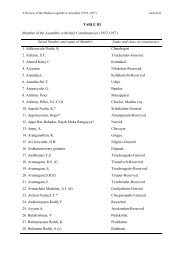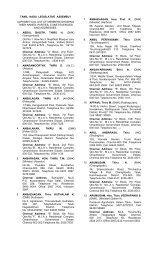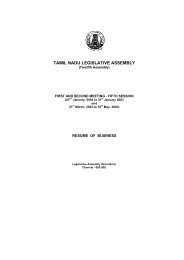REVIEW - Tamil Nadu Legislative Assembly - Tamil Nadu Government
REVIEW - Tamil Nadu Legislative Assembly - Tamil Nadu Government
REVIEW - Tamil Nadu Legislative Assembly - Tamil Nadu Government
You also want an ePaper? Increase the reach of your titles
YUMPU automatically turns print PDFs into web optimized ePapers that Google loves.
(1) General<br />
54 55<br />
CHAPTER XI<br />
QUESTIONS<br />
Question Hour in the House of the Legislature is considered as an important<br />
and significant transaction in a Parliamentary Democracy. It provides an<br />
opportunity for the members to seek and to obtain or elicit information on a<br />
matter of public interest on the floor of the House. This exercise of putting<br />
questions to Ministers directly on the floor of the House establishes the control<br />
and supervision of legislature over executive. Thus, question hour throws more<br />
light on several aspects of administration. The quickness with which the<br />
Members formulate supplementaries based on the answer furnished by the<br />
Ministers and the corresponding place with which the Minister replies to those<br />
supplementaries make the proceedings of the question hour more attractive and<br />
lively. Each day of the business of the House is thus commenced with a concerted<br />
participation by all concerned in the House.<br />
The first hour of a sitting is provided for questions and answers. Though<br />
the main purpose of question hour is to put questions to the Ministers to elicit<br />
information, the inherent right conferred on the member with the consent of the<br />
Hon. Speaker, to raise supplementaries gives an opportunity to the member to<br />
bring omissions and commissions in administration to the notice of the<br />
<strong>Government</strong> for appropriate immediate action. The <strong>Government</strong> is also kept in<br />
touch with the public through questions and gauge the public opinion. The<br />
member may bring to the notice of the <strong>Government</strong> the grievances of their<br />
constituencies and related issues affecting the public, which otherwise would<br />
have gone unnoticed.<br />
Notice of questions<br />
A member who desires to table a question shall give notice of the same in<br />
writing to the Secretary. There is no restriction about the number of question to<br />
be given notice of by a member. Questions are received all through the year<br />
even during non-session period and they are processed with reference to the<br />
T.N.L.A. Rules and guidelines issued by the Hon. Speaker. They are then<br />
admitted and forwarded to the concerned departments within 15 days from the<br />
date of its receipt, with a request to send the answers within 42 days. Such<br />
admitted questions shall normally be entered in the list of questions on the forty<br />
second day at the latest after the day on which they are admitted by the Speaker.<br />
When a Member’s question has been admitted and other Members give notice<br />
of questions on the same subject subsequently, the names of all the members<br />
are clubbed and one common answer is given.<br />
Type of Questions:<br />
Generally questions are of three categories, namely (1) Starred (2) Unstarred<br />
and (3) Short Notice Questions.<br />
(1) Starred questions:<br />
A starred Question is one to which a Member desires an oral answer in the<br />
House. Such questions are distinguished by an asterisk mark. Answers to such<br />
questions are furnished orally in the House by the concerned Ministers. However,<br />
if the answer to such questions requires lengthy statement, such statements are<br />
laid on the Table of the House on the date on which the particular question has<br />
been included in the question list and it will form part of the official proceedings.<br />
Members have a right to put supplementaries on such answers.<br />
(2) Unstarred Questions:<br />
An unstarred question is one which does not bear an asterisk mark or which<br />
is deemed appropriate for a written answer, the Speaker may direct that such<br />
question be classified an Unstarred question. Questions requiring long statements<br />
or statistics are generally admitted as unstarred questions. Answers to such<br />
questions are laid on the Table of the House and printed in the official proceedings<br />
of the <strong>Assembly</strong>.<br />
Conversion of starred questions into unstarred questions:<br />
(Rule-51 of TNLA Rules)<br />
The Speaker, in his discretion, unstarred such of those questions that are<br />
pending answer at the end of a session or at the end of a meeting and order to<br />
place such answers on the table of the House. 5767 starred questions have been<br />
converted as unstarred questions and placed on the Table of the House during<br />
the Eleventh <strong>Assembly</strong>.





